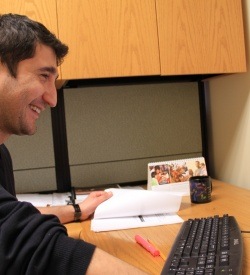I started my professional development fellowship with the Aga Khan Foundation U.S.A. (AKF USA) last November after two years of work as a Program Officer at FOCUS Humanitarian Assistance (FOCUS) in Tajikistan. This internship experience provided me a unique opportunity to observe and understand the work of AKF USA, which is typically considered a “donor” agency to other AKF units across the world. This fellowship particularly interests me because it gives me the chance to learn the tools used by AKF USA in developing long-term policies and strategies within the Aga Khan Development Network, and draw parallels between the activities of AKF USA and field organizations like FOCUS in Tajikistan. With this knowledge base I will be able to think more proactively about future collaborations between AKF USA and FOCUS in Tajikistan.

Imomberdi Berdov, Professional Development Fellow at the Aga Khan Foundation U.S.A. and Program Officer at FOCUS Humanitarian Assistance, Tajikistan
FOCUS has been working in Tajikistan for almost 15 years. Its work predominantly encompasses Disaster Risk Reduction, from disaster awareness to disaster preparation, mitigation, and rapid response. These activities focus on building resiliency among vulnerable populations to cope with natural disasters and thus contribute to the reduction of poverty, since prepared populations can reduce the level of suffering, loss of property, and businesses caused by emergencies.
I admire the direct impact FOCUS has been able to achieve. Their first aid trainings help communities keep victims alive until health professionals are able to reach the affected areas. Additionally, because cell phone towers can get destroyed in an earthquake or land slide, FOCUS has established one of the only forms of reliable communication. They have created a radio network that connects almost 100 systems from remote communities in Tajikistan to emergency help centers. Other beneficial physical interventions by the organization include the development of structural mitigation works like hydro insulation for irrigation channels to prevent landslides by stopping water seepage, as well as the construction of evacuation bridges and retention walls to mitigate rock falls.
Recently Tajikistan ratified a National Strategy for Disaster Risk Reduction that clearly defined priorities for the country to reduce the negative effects of natural disasters. For me, it is particularly important to see the progress of this strategy’s implementation.
It has been almost four months since I started my professional development fellowship here in Washington, DC and every day I feel that I am discovering new things, both professionally and personally. My work in the Program Department helps me to better understand the diversity of AKF’s work, as well as develop my knowledge base in other sectors of international development.
The tasks I have been assigned throughout my internship have mostly consisted of supporting AKF USA program officers in developing project proposals to donor agencies. My recent involvement in proposal development has been with the project, “Quality Reading in Central Asia.” This endeavor has enriched my knowledge within the sector of development education, the problems existing in Central Asia within the field, and the strategic objectives of the United States government to overcome poverty and illiteracy around the world.
Another major exercise was to support the program officers in developing country and sector overviews. This included learning of the US Government’s 2013 international development plans in countries and sectors of interest to AKF USA and drawing assumptions on the potential utilization of US international development funds.
I am convinced that the relationships I’ve fostered with my AKF USA colleagues will continue to grow even after I return to Tajikistan. The time I have spent here has given me invaluable experience and I am confident that I will be able to apply my experience and new skill set to more effectively contribute to the successful operations of my organization in Tajikistan.